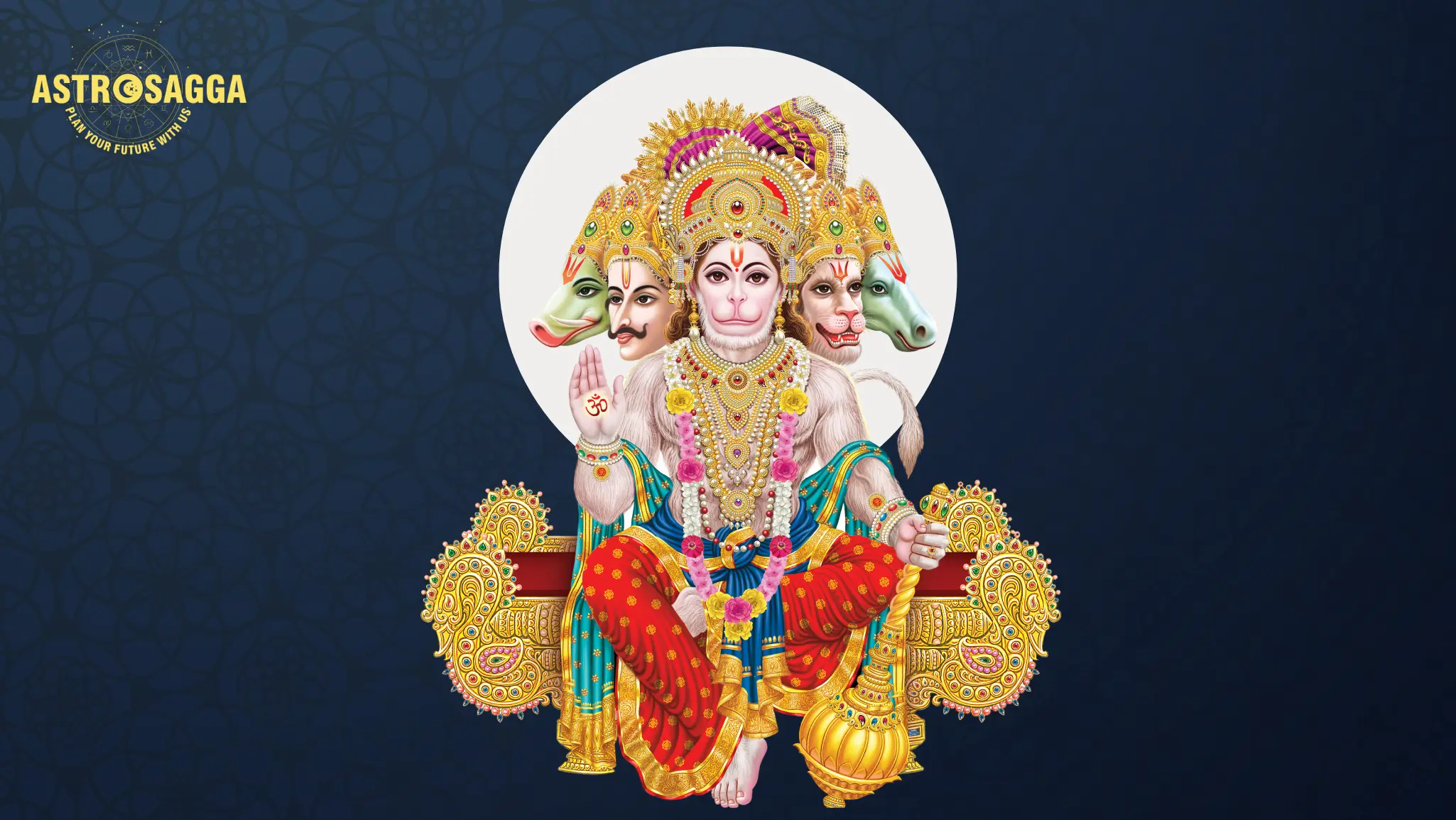What are the benefits and importance of Sunderkand path?
Sunderkand - Source of Immense Power

Introduction to Sunderkand:
Sundarkand, a majestic section within the revered Indian epic, the Ramayana, represents a pinnacle of spiritual narrative and devotion. This segment, adorned with rich symbolism and moral teachings, centers on the heroic exploits of Lord Hanuman, the epitome of unwavering dedication and service in Hindu mythology. Sunderkand, meaning "e;beautiful chapter,"e; captivates hearts with its portrayal of divine intervention, moral dilemmas, and the triumph of righteousness over malevolence.
History of Sunderkand:
Sunderkand is the part of Valmimiki Rmayana and Tulsidas Ramcharitmanas. It started when the King of Monkeys “Sugreev” ordered his army to get information about “Goddess SIta” who was imprisoned in Lanks (The Kingdom of Ravana).
When the monkey' army reached the Ocean' shore, they could not find the way to cross that ocean then “Jamwant”, who was the senior instructor of the army, told about Lord Hanuman’s Power. Sunderkand starts from that moment, with following lines :-
जामवंत के बचन सुहाए। सुनि हनुमंत हृदय अति भाए॥
तब लगि मोहि परिखेहु तुम्ह भाई। सहि दुख कंद मूल फल खाई॥
One of the famous doha, which was said by Jamwant is also famous, which comes in use when devotee of Lord hanuman chants:-
कवन सो काज कठिन जग माहीं। जो नहिं होइ तात तुम्ह पाहीं॥
राम काज लगि तव अवतारा। सुनतहिं भयउ पर्बताकारा॥3॥
Sundarkand finds its roots in the ancient Indian literary tradition, particularly within the Ramayana, attributed to the sage Valmiki. Composed in Sanskrit, this epic masterpiece weaves together the timeless saga of Lord Rama, an incarnation of the Hindu deity Vishnu, and his arduous quest to rescue his beloved wife, Sita, from the clutches of the demon king Ravana. Sundarkand, as the fifth section of the Ramayana, delves deep into the narrative, focusing primarily on the exploits of Hanuman as he embarks on a perilous journey to Lanka in search of Sita.
The chapter unfolds with Hanuman' leap across the vast ocean, his encounters with various obstacles and adversaries, and his eventual discovery of Sita, held captive in the Ashoka grove within Ravana' kingdom. Hanuman' unwavering devotion to Lord Rama and his exemplary acts of courage, wisdom, and humility serve as the cornerstone of Sunderkand, inspiring generations of devotees to emulate his virtues and seek solace in his divine grace.
Importance of Sunderkand:
The significance of Sunderkand extends far beyond its literary and mythological dimensions, permeating deeply into the spiritual and cultural fabric of Hinduism:
- Devotional Inspiration: Sundarkand serves as a beacon of inspiration for devotees, igniting the flames of devotion and reverence towards Lord Hanuman and Lord Rama. Through Hanuman' unyielding commitment to his divine master and his selfless service, Sundarkand instills a sense of devotion and surrender in the hearts of those who seek spiritual elevation.
- Symbolism and Morality: Within the intricate tapestry of Sunderkand lies a treasure trove of moral and ethical teachings. The characters, events, and dialogues woven into the narrative convey timeless truths and principles that resonate with the human experience. Hanuman' virtuous character, his unwavering loyalty to righteousness, and his indomitable spirit exemplify ideals of courage, humility, and selflessness, inspiring individuals to uphold these values in their own lives.
- Divine Intervention: Sundarkand showcases the power of divine intervention and grace in the face of adversity. Hanuman' journey to Lanka, fraught with challenges and dangers, underscores the guiding hand of destiny and the transformative impact of faith and devotion. Through his unwavering resolve and divine assistance, Hanuman overcomes seemingly insurmountable obstacles, ultimately paving the way for the reunion of Lord Rama and Sita and the restoration of righteousness.
- Healing and Protection: Many devotees turn to Sundarkand for spiritual solace, healing, and protection. The recitation or chanting of verses from Sundarkand is believed to invoke the blessings of Lord Hanuman, bestowing divine protection from malevolent forces and alleviating suffering and affliction. It is regarded as a potent spiritual remedy for dispelling negative energies, overcoming obstacles, and fostering physical, emotional, and spiritual well-being.
Powerful Hanuman Mantras
Benefits of Sunderkand:
The recitation, study, or contemplation of Sunderkand offers a myriad of benefits for devotees seeking spiritual growth, protection, and divine grace:
- Spiritual Upliftment: Sundarkand serves as a sacred reservoir of spiritual wisdom and inspiration, nurturing a deeper connection with the divine. The profound teachings embedded within its verses awaken the soul to higher truths, fostering feelings of peace, devotion, and gratitude.
- Removal of Obstacles: Devotees often turn to Sundarkand as a powerful means of overcoming obstacles and challenges in their lives. The divine potency of Hanuman' blessings and the transformative power of his grace are believed to dispel hindrances, clear pathways, and usher in favorable outcomes.
- Protection and Blessings: The recitation or chanting of Sunderkand is considered a potent form of spiritual protection, shielding devotees from negative influences, adversities, and calamities. By invoking the blessings of Lord Hanuman, devotees seek divine guidance, strength, and fortitude to navigate life' trials and tribulations with grace and resilience.
- Inner Transformation: Sundarkand facilitates profound inner transformation and growth, inspiring individuals to cultivate virtues such as courage, humility, and selflessness in their lives. Through the exemplary character of Hanuman and the moral lessons embedded within the narrative, devotees are encouraged to emulate noble qualities and strive towards spiritual excellence.
How to Do Sunderkand
Performing Sunderkand involves several steps, primarily focused on reading, reciting, or listening to the verses with devotion and reverence. Here' a guide on how to do Sunderkand:
- Preparation:
- Set aside a quiet and peaceful space where you can focus without distractions.
- Ensure you have a copy of the Sunderkand text, whether in a physical book or digital format.
- Invocation:
- Begin by invoking the blessings of Lord Hanuman and Lord Rama. You can do this by reciting a simple prayer or mantra, such as the Hanuman Chalisa or the Rama Gayatri mantra.
- Purification:
- Purify your mind and body by taking a moment to center yourself through deep breathing or meditation.
- You can also perform a traditional purification ritual, such as sprinkling water on yourself or lighting incense.
- Recitation or Reading:
- Start reciting or reading the verses of Sunderkand with clarity and sincerity.
- If you're reciting aloud, focus on pronouncing each word correctly and with reverence.
- If you're reading silently, try to internalize the meaning of the verses and reflect on their significance.
- Devotion and Focus:
- Maintain a sense of devotion and focus throughout the recitation or reading.
- Visualize Lord Hanuman' journey and his acts of devotion and courage as described in Sunderkand.
- Let your heart be filled with love and reverence for the divine as you immerse yourself in the sacred text.
- Reflection:
- Take breaks between sections to reflect on the verses you've read or recited.
- Contemplate the moral teachings, symbolism, and messages conveyed in Sunderkand.
- Allow the wisdom of the text to resonate with you and inspire positive thoughts and actions.
- Conclusion:
- Once you've completed the recitation or reading of Sunderkand, offer a final prayer of gratitude to Lord Hanuman and Lord Rama.
- Express your sincere reverence and devotion, and seek blessings for yourself and your loved ones.
- Sharing and Community:
- Consider sharing your experience of doing Sunderkand with others, whether through discussion, prayer groups, or social media.
- Encourage others to explore the spiritual significance of Sunderkand and its transformative power.
- Regular Practice:
- Make Sunderkand a regular part of your spiritual practice, whether by reciting it daily, weekly, or on special occasions.
- Cultivate a deeper connection with the divine through consistent devotion and engagement with sacred texts.
By following these steps with sincerity and devotion, you can experience the spiritual benefits of Sunderkand and deepen your connection with the divine presence of Lord Hanuman and Lord Rama.
In essence, Sundarkand stands as a timeless testament to the power of devotion, the triumph of righteousness, and the enduring legacy of divine grace. Its verses resonate with the echoes of ancient wisdom, offering solace, guidance, and inspiration to seekers of truth and spiritual seekers alike, transcending the boundaries of time and space. As devotees immerse themselves in the sacred journey of Hanuman, they are drawn closer to the divine, finding refuge and renewal in the eternal embrace of divine love and grace.















